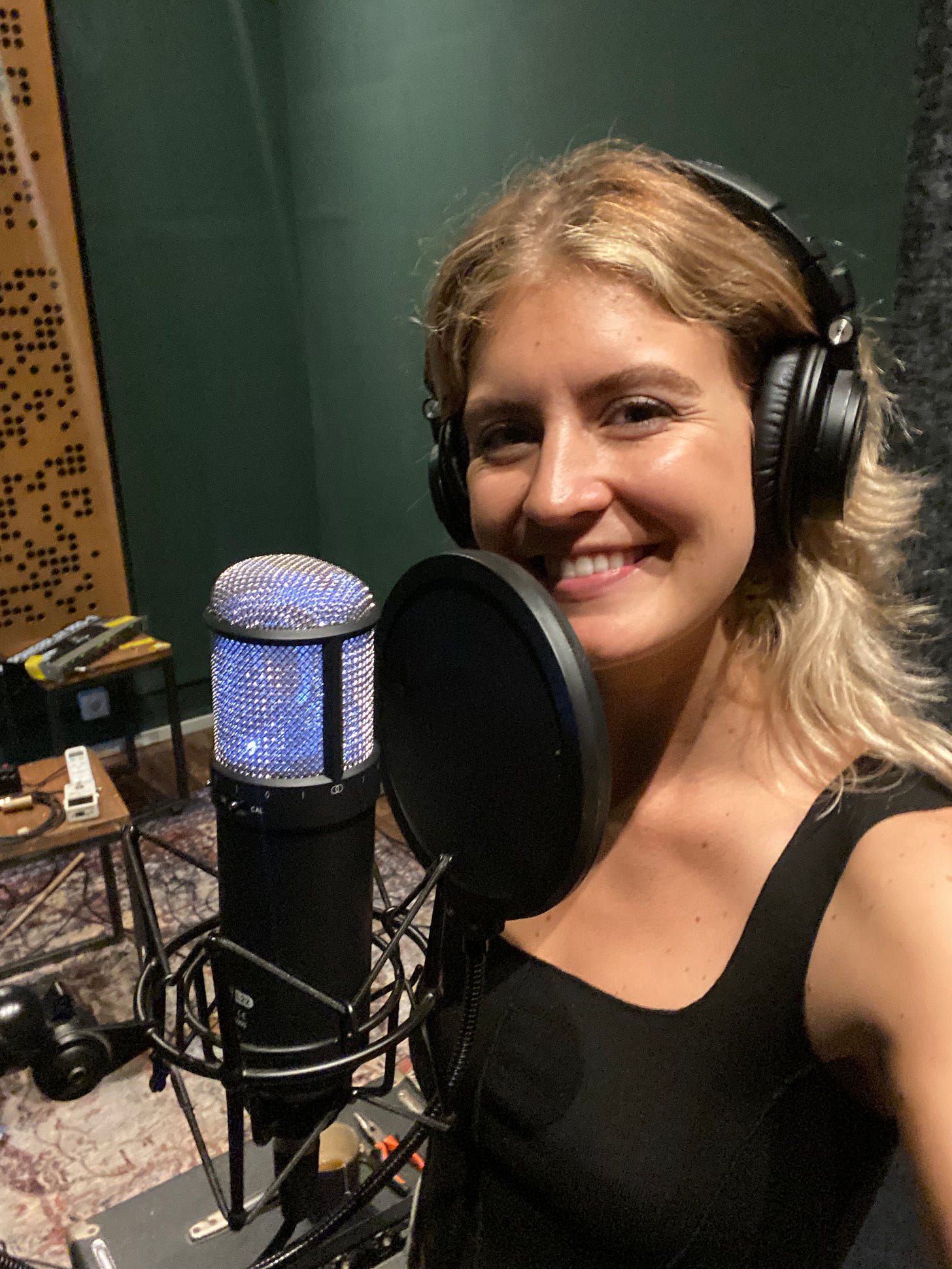Singers, stop working for free
Musicians, too! Everything you need to hear to (finally) break out of doing unpaid work, and level up.
F*** the Favor Economy
A couple of weeks ago, my friend Chris asked me to sing backup vocal on his new album.
I’ve been inspired by his music over the last few years, and supporting him seemed like a no-brainer.
He said, "I just need you to sing some oooo's and ahhhh's. Oh, and a few harmonies over the main vocal." Sounds simple, right?
Wrong.
That tiny favor amounted to 4 hours in the studio, and we didn't even finish. I'll go back in for another half-day session this week.
For years, I've given my voice freely in my music community. I was always the "yes girl" who would sing on recordings because the imposter in me said, "You could use the experience!!" Most stuck my name in album credits. One guy even listed me as "featured" on the official track. That was nice, at the time.
But none of them ever paid me.
Ok, to be fair… I never asked. I had fallen into this seemingly nice “let ’s-do-each-other-favors” economy among artists. I suppose it comes with good intentions: 🎶 I help you, you help me! We’re a happy broke a* family! 🎶 (Sing that to the tune of Barney)
But have I ever cashed in my owed favors? Nope.
That’s why when my friend Chris offered to pay me, I immediately blurted out, “Oh no, I can’t accept that.” But he insisted.
Gosh, that meant a lot to me.
And let me be clear – it’s not about earning cash. Being compensated made me feel like my hard work was appreciated and valued as work.
A singer’s voice is a professional service, not a free gift. Here’s why:
Voice Adds Value: Listen to this song here. That’s my voice on the introductory hook. It gives the song character. It pulls people in. That was a favor I gave willingly at the time, for my 'early career development’ one could say. Now, it’s the most popular track on their new album. Not saying it was all because of my voice. But it added value, certainly.
The Hidden Cost of “Helping Out”: Working in the studio takes my precious time. In fact, I lose money by taking time off from my online job. If I earn $40/hour at my online job and spend 4 hours in the studio, that's $160 of potential income I've sacrificed. Add driving time, prep, and the mental energy spent, and the 'favor' starts to look more like a financial investment on my part.
More Than Just Singing: I like to believe I’m professional and efficient in the studio. Singing in the studio is NOT how you see it in movies with the band drinking and smoking and goofing off. In real life, efficiency is key because studio time is charged by the hour. My ability to focus and follow direction has value.
“We need your vocal on the chorus, one octave higher.”
“Great, now let’s listen back to that and check it.”
“That works, now double it.”
Repeat. Repeat. Repeat.
The Invisible Labor: I have invested in singing lessons, I commit to breathing exercises and regular practice. My voice is a muscle I have toned just like going to the gym. My time in the studio is only the tip of the iceberg in terms of time I have spent maximizing my voice.
Now, this newsletter isn’t meant to sound like a rant or a complaint. It’s me calling out myself and other singers/artists for falling into imposter syndrome and allowing that pesky, ever-persisting starving artist mindset to keep us small. And it’s me calling out those who believe the favor economy is mutually beneficial – it’s not.
Favor economies can keep artists trapped in a cycle of unpaid labor. They create an illusion of opportunity for emerging artists, masquerading as networking, exposure, and skill development.
Take my recent experience: When my producer suggested finding a friend to play guitar and bass for my new song, my first instinct was to ask for a "quick favor." But that's exactly the mindset that perpetuates this broken system.
In the end, I did ask a talented friend of mine and he worked really hard over 3 sessions, putting in over 15 hours. That is no small favor, people.
I insisted on paying him BECAUSE he’s my friend and I wanted him to feel appreciated for what I consider a vital contribution to my project. The money symbolizes my belief in the value of his skills. The money essentially means – you’re a legend, I appreciate you.
So let’s stop asking fellow artist friends for favors. If you respect them, appreciate them, and want them to grow – budget to pay them.
Bottom line: Artists, know your worth.
Ask yourself: Are you really benefitting from all that free work?
We deserve better than the 'favor economy' – and it starts with us valuing our own skills. And if you want a professional service, pay for it. It’s time to break the cycle.
And a final shoutout to Chris. Once he drops his album I’m sharing it with y’all.
Feel free to click the ❤️ button on this post so more people can discover it on Substack.
Much love chickos and chickettes,








Right on, sister!!!